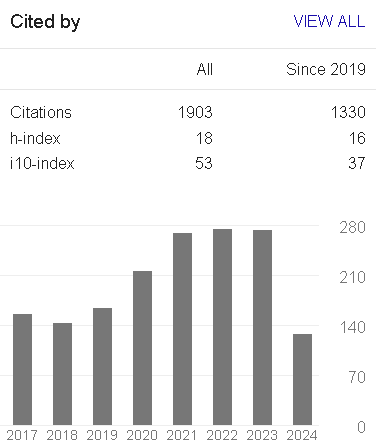Evaluating the performance of different image binarization techniques
Keywords:
Documents, Binarization, thresholding, Binary imageAbstract
Image binarization is the methodology of separating of pixel values into dual collections, dark as frontal area and white as background. Thresholding has discovered to be a well-known procedure utilized for binarization of document images. Thresholding is further divided into global and local thresholding technique. In document with contrast delivery of background and foreground, global thresholding is discovered to be best technique. In corrupted documents, where extensive background noise or difference in contrast and brightness exists i.e. there exists numerous pixels that cannot be effortlessly categorized as foreground or background broad foundation. In such cases, local thresholding has significant over available techniques. The principle target of this paper is to evaluate the performance of the distinct image binarization strategies and to discover the best technique among some well-known existing methods. Documents
References
Su, Bolan, Shijian Lu, and Chew Lim Tan. "Robust document image binarization technique for degraded document images." Image Processing, IEEE Transactions on 22.4 (2013): 1408-1417.
Su, Bolan, et al. "Self Learning Classification for Degraded Document Images by Sparse Representation." Document Analysis and Recognition (ICDAR), 2013 12th International Conference on. IEEE, 2013.
Wagdy, M., Ibrahima Faye, and DayangRohaya. "Fast and efficient document image clean up and binarization based on retinex theory." Signal Processing and its Applications (CSPA), 2013 IEEE 9th International Colloquium on. IEEE, 2013
Rabeux, Vincent, et al. "Quality evaluation of ancient digitized documents for binarization prediction." Document Analysis and Recognition (ICDAR), 2013 12th International Conference on. IEEE, 2013.
Gaceb, Djamel, Frank Lebourgeois, and Jean Duong. "Adaptative Smart-Binarization Method: For Images of Business Documents." Document Analysis and Recognition (ICDAR), 2013 12th International Conference on. IEEE, 2013.
Seki, Minenobu, et al. "Color Drop-Out Binarization Method for Document Images with Color Shift." Document Analysis and Recognition (ICDAR), 2013 12th International Conference on. IEEE, 2013
Smith, Elisa H. Barney, and Chang An. "Effect of" ground truth" on image binarization." Document Analysis Systems (DAS), 2012 10th IAPR International Workshop on. IEEE, 2012.
Papavassiliou, Vassilis, et al. "A Morphology Based Approach for Binarization of Handwritten Documents." Frontiers in Handwriting Recognition (ICFHR), 2012 International Conference on. IEEE, 2012.
Pratikakis, Ioannis, Basilis Gatos, and KonstantinosNtirogiannis. "ICFHR 2012 competition on handwritten document image binarization (H-DIBCO 2012)."Frontiers in Handwriting Recognition (ICFHR), 2012 International Conference on. IEEE, 2012.
Su, Bolan, Shijian Lu, and Chew Lim Tan. "A learning framework for degraded document image binarization using Markov random field." Pattern Recognition (ICPR), 2012 21st International Conference on. IEEE, 2012.
Le, T. Hoang Ngan, Tien D. Bui, and Ching Y. Suen. "Ternary entropy-based binarization of degraded document images using orphological operators."Document Analysis and Recognition (ICDAR), 2011 International Conference on. IEEE, 2011.
Su, Bolan, Shijian Lu, and Chew Lim Tan. "Combination of document image binarization techniques." Document Analysis and Recognition (ICDAR), 2011 International Conference on. IEEE, 2011.
Shaikh, SoharabHossain, AsisMaiti, and NabenduChaki. "Image binarization using iterative partitioning: A global thresholding approach."Recent Trends in Information Systems (ReTIS), 2011 International Conference on. IEEE, 20.
Downloads
Published
How to Cite
Issue
Section
License
Copyright (c) 2014 COMPUSOFT: An International Journal of Advanced Computer Technology

This work is licensed under a Creative Commons Attribution 4.0 International License.
©2023. COMPUSOFT: AN INTERNATIONAL OF ADVANCED COMPUTER TECHNOLOGY by COMPUSOFT PUBLICATION is licensed under a Creative Commons Attribution 4.0 International License. Based on a work at COMPUSOFT: AN INTERNATIONAL OF ADVANCED COMPUTER TECHNOLOGY. Permissions beyond the scope of this license may be available at Creative Commons Attribution 4.0 International Public License.


